Jaidev ~ The Jinxed Genius

छोटे से जीवन में कितना प्यार करूं, पीलूं हाला,
आने के ही साथ जगत में, कहलाया जानेवाला;
स्वागत के ही साथ विदा की होती देखी तैयारी,
बंद लगी होने खुलते ही मेरी जीवन ‘मधुशाला’
(Chhote se jeevan mein kitna pyar karun, piloon haala,
Aane ke hi saath jagat mein, kehlaya jaanewala;
Swagat ke hi saath vida ki hoti dekhi tayyaari,
Bandd lagi hone khulte hi meri jeevan ‘Madhushala’ )
The couplet of Harivanshrai Bachchan from his universally acclaimed lyrical work “Madhushala” sums up the excruciating saga of Jaidev, one of the greatest but unforgivably unsung and unwept maestros of yore. He shed the mortal coil and left the world when he had just ‘arrived’; his going was as imminent as his ‘coming’; his adieu was forgone in the ‘welcome’ and the closure preempted the opening in the bachhanal tavern of his life.
Jaidev passed away on tearful Tuesday, 6 January, 1987, enduring the fierce onslaught of fate right from the dawn of his sensibilities. What more could he long for in life and what more could he crave for from the ruthless world.
जग में जिस रोज़ से आया, बड़ी रुसवाई है,
जिस्म पाया है तो जीने की सज़ा पायी है।
(Jag mein jis roz se aaya, badi ruswayee hai,
Jism paaya hai to jeene ki sazaa paayi hai)
Legendary maestro Naushad’s couplet says it all: Jaidev lived to suffer and suffered to live. Life verily unraveled a unique, unreasonable and unkind cut to him. But, death was more than gracious to emancipate him from the catastrophes of life.
When he died, he failed to bequeath a fortune for his family. Because, he neither made a fortune in his life time nor did he have a family of his own to bemoan his demise; none existed of his kin for him to hand down his property.
Journey of a Genius
Jaidev Verma was born on 3 August, 1918 in Nairobi. His father worked as a station master there and they returned to India in 1927. After his mother died, he and his younger brother were left under the care of his childless maternal uncle and aunt in Ludhiana. Jaidev went to the Arya High School at Ludhiana. He gave up studies after Class Seven but his erudition is no less, learning immensely from the harsh and inconsiderate realities of life.
The musical predilection of Jaidev found expression when he started playing the harmonica as a toddler. His brother played the Tabla and together they regaled their relatives and friends. While in school, he was initiated to music by Prof. Barkat Rai from whom he learnt music for about three to four years in the tradition set down by Pandit Vishnu Digambar Paluskar. He also attended regularly the Harvallabh Sangeet Mela, an annual music festival held at Jullandhar; there he had the rare opportunity of listening to eminent musicians of the country.
The early influence of his mother too enwrapped him musically as his mother recited the Ramayana and sang folklore with mellifluous ease and soulful elan. The hope-filled song O pagle der na hogi palchhin ki from Kinare Kinare is inspired from a song that his mother would sing while watering the Tulsi plant; one more song O mitwa.. badra chhaaye re from Maan Jaaiye has its base in yet another devotional ditty Main to aa rahi thi, bansi kaahe ko bajaaye that his mother sang. A genius emerged in the making but a series of misfortunes catapulted him to be labeled as a Jinxed Genius.
Fascination for Films
 As a teenager, Jaidev found himself in the throes of fascination by the films made in the early thirties. He watched films at the Kailash Theatre in Ludhiana. When he was fifteen, enamoured by the glamour world, he fled to Bombay, the City of Dreams, the Mecca of Indian Cinema only to get a glimpse of his favourite stars like Master Vithal, Zubeida, Ruby Mayers, Jahan Ara Kajjan. He was fascinated by the film Alibaba aur 40 Chor made by Madan Theatres and was particularly impressed by Kajjan’s song Ilaahi in dinon taqdeer kyon gardish dikhaati hai? This is to interrogate in his future when fate kept on playing truant with him from time to time!
As a teenager, Jaidev found himself in the throes of fascination by the films made in the early thirties. He watched films at the Kailash Theatre in Ludhiana. When he was fifteen, enamoured by the glamour world, he fled to Bombay, the City of Dreams, the Mecca of Indian Cinema only to get a glimpse of his favourite stars like Master Vithal, Zubeida, Ruby Mayers, Jahan Ara Kajjan. He was fascinated by the film Alibaba aur 40 Chor made by Madan Theatres and was particularly impressed by Kajjan’s song Ilaahi in dinon taqdeer kyon gardish dikhaati hai? This is to interrogate in his future when fate kept on playing truant with him from time to time!
Jaidev acted in about seven films made by Wadia Movietone; he played the role of Narada in Waman Avtaar and Nanko in Veer Bharat both made in 1934. Both the cameo earned him a toehold. Unheard songs like Rakho joaag daaman mein kaho anjaam kya aaye and Paraayi peer jaane veer bharat ho to aisa ho were picturised on Jaidev. He acted in some more films like Kaala Gulab (1934), Hunterwali (1935), Desh Deepak (1935) and Miss Frontier Mail (1936). Acting probably was a stepping stone what he wanted to pursue: Music.
Man on the Move
Jaidev went to Ludhiana following the demise of his uncle in 1936 and he returned to Bombay after a year or two. By then, he had lost interest in acting as the studio arc lights started taking a toll on his eye sight. He was gifted with a better ‘vision’ made evident from his decision to take music lessons from Master Krishnarao Chonkar. He also trained himself in Hindustani music from the Jaokar brothers (Krishnarao Jaokar and Janardhan Jaokar of the Kirana Gharana).
In 1940, he went back to Ludhiana to take care of his father who had returned to India following health problems. And, after he also passed away in 1943, Jaidev once again went back to Bombay to fulfill his filial responsibility; like a dutiful brother he got his sister married, now settled in London.
The journey of his life further took him to Almora in 1943. The programmes he presented in radio exhibited his flair and proficiency in Hindi, Urdu and Sanskrit which earned him a lot of acclaim. Here, he came in contact with the fiery Sahir Ludhianvi who was studying then in the Government College, Ludhiana. Jaidev gave him a break in radio to recite his revolutionary poems. In Simtola, 3 kms from Almora in Uttarkhand Himalayas, he joined the Uday Shankar’s India Cultural Centre with a compulsive urge to learn the sarod from the renowned sarod maestro Ustad Allaudin Khan, then on the payroll of the academy.
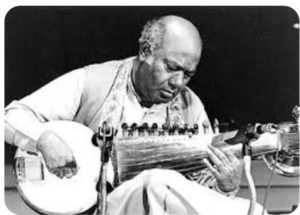 After the academy closed down in 1945, a disheartened Jaidev went to Lucknow with a recommendation letter from Uday Shankar to meet the sarod maestro Ustad Ali Akbar Khan (son of Ustad Allaudin Khan). The Ustad took an instant liking for his Shagird; he took him under his wings, offered him tutelage, provided shelter to his protégé, bought him a sarod and taught him the instrument. He took him wherever he toured in connection with his concerts and Jaidev remembered this benevolent gesture of the Master unto his last.
After the academy closed down in 1945, a disheartened Jaidev went to Lucknow with a recommendation letter from Uday Shankar to meet the sarod maestro Ustad Ali Akbar Khan (son of Ustad Allaudin Khan). The Ustad took an instant liking for his Shagird; he took him under his wings, offered him tutelage, provided shelter to his protégé, bought him a sarod and taught him the instrument. He took him wherever he toured in connection with his concerts and Jaidev remembered this benevolent gesture of the Master unto his last.
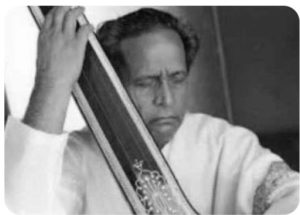 As an ode to his mentor, he used liberally the sarod in a number of songs – from the early Jogia tose naina lagaake (Anjali), Prabhu tero naam (Hum Dono) to Jaise suraj ki garmi se (Parinay), Maata saraswati sharda Chand akela, Koyi gaata main so jaata, Nayi ri lagan aur meethi batiyan and Zindagi ko sanwaarna hoga (Alaap), Seene mein jalan and Aap ki yaad aati rahi (Gaman), Ye khwab sa dekha tha (Aayi Teri Yaad) to Main to kab se teri sharan mein hoon (Ram Nagri), Raghuvar tumko meri laaj and Mujhko bhi radha banaale nandlal (Ankahee), More naina jaage saari rayna (from the unreleased Footpath).
As an ode to his mentor, he used liberally the sarod in a number of songs – from the early Jogia tose naina lagaake (Anjali), Prabhu tero naam (Hum Dono) to Jaise suraj ki garmi se (Parinay), Maata saraswati sharda Chand akela, Koyi gaata main so jaata, Nayi ri lagan aur meethi batiyan and Zindagi ko sanwaarna hoga (Alaap), Seene mein jalan and Aap ki yaad aati rahi (Gaman), Ye khwab sa dekha tha (Aayi Teri Yaad) to Main to kab se teri sharan mein hoon (Ram Nagri), Raghuvar tumko meri laaj and Mujhko bhi radha banaale nandlal (Ankahee), More naina jaage saari rayna (from the unreleased Footpath).
Spiritual Synthesis
Jaidev led a nomadic life and constant travel from place to place and the varying climatic conditions affected his health. He suffered from asthma; as he didn’t have a place of his own, he went to Shimla, where his sister lived, to take rest and recuperate (much later in life, the rum he had from the navy canteen in Bombay had a curative effect on his ailment). He decided to remain a bachelor all his life and then went to Hrishikesh to stay in the ashram of Swami Shivananda Saraswati. In his four months stay at the ashram, he was initiated to the philosophical works of great saints like Swami Ram Tirth and Swami Shivananda to imbibe the spiritual quotient.
In 1946, he fulfilled one more parental responsibility and got his younger brother married. Jaidev suffered a big jolt when he lost his brother within a year or so. Totally shattered, his outlook began to change completely. The visionary in him was to fine tune him, making him more human, more spiritual, stoic to pains and pleasures of life, to detach him from the world and the transient comforts the world offered.
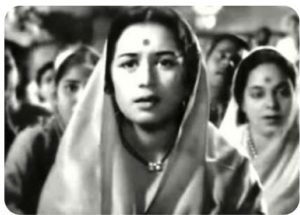 His spiritual leaning is manifest in an ensemble of ethereal compositions like Allah tero naam, Prabhu tero naam, Jaise suraj ki garmi se, Piya se milan kaise hoye ri, Maata saraswati sharda, Bole radha shyam diwani, Tumhen dekhti hoon, Bansuriya mann har le gayi, Raghuvar tumko meri laaj, Thumak thumak pagh thumak kunj madh, Main jaanu naahin piya ko milan kaise hoye ri, Main to kab se teri sharan mein hoon to name a few.
His spiritual leaning is manifest in an ensemble of ethereal compositions like Allah tero naam, Prabhu tero naam, Jaise suraj ki garmi se, Piya se milan kaise hoye ri, Maata saraswati sharda, Bole radha shyam diwani, Tumhen dekhti hoon, Bansuriya mann har le gayi, Raghuvar tumko meri laaj, Thumak thumak pagh thumak kunj madh, Main jaanu naahin piya ko milan kaise hoye ri, Main to kab se teri sharan mein hoon to name a few.
Mumbai ~ Movies ~ Music
Jaidev went to Jodhpur in 1948 – 49 to join Ustad Ali Akbar Khan again, then in the patronage of the King of Jodhpur. When the Ustad got offers from Dev Anand to compose music for films: Aandhiyan (1951) and Humsafar (1953), Jaidev accompanied the Ustad and assisted him. While working in Navketan (Dev Anand’s film company), he had his first interface with the actor’s favourite composer S D Burman. He then went to work with him as his assistant from Taxi Driver (1954) directed by Chetan Anand right up to Guide (1965) directed by Vijay Anand.
Jaidev Juggernaut
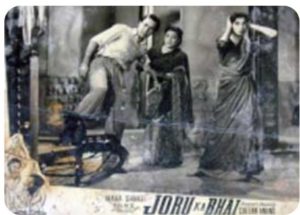 Jaidev got a break as an independent composer in 1955 to compose music for the film Joru Ka Bhai directed by Chetan Anand. The film is remembered today for the plaintive thumri style ghazal, Ab tera intzaar kaun kare penned by Sahir and rendered by Talat Mahmood. The ghazal has its base in Ustad Abdul Karim Khan’s famous Jhinjhoti based thumri, Piya bin aawat naahin chain. Joru Ka Bhai was followed by a Buddhist period film Anjali, also made by Chetan Anand and the film was way ahead of its time. Both the films flopped and the jinx followed him loyally till his last.
Jaidev got a break as an independent composer in 1955 to compose music for the film Joru Ka Bhai directed by Chetan Anand. The film is remembered today for the plaintive thumri style ghazal, Ab tera intzaar kaun kare penned by Sahir and rendered by Talat Mahmood. The ghazal has its base in Ustad Abdul Karim Khan’s famous Jhinjhoti based thumri, Piya bin aawat naahin chain. Joru Ka Bhai was followed by a Buddhist period film Anjali, also made by Chetan Anand and the film was way ahead of its time. Both the films flopped and the jinx followed him loyally till his last.
Burman Baton
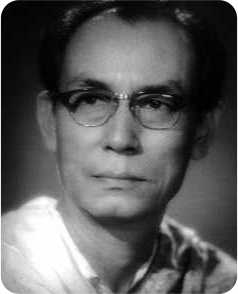 Even while giving music independently, he continued to assist S D Burman in a host of films. The latter had full trust in the genius of his assistant. I remember Majrooh Sahab telling that each time Dada Burman entrusted Jaidev with a composing or creative job, he would advise him not to complicate it with difficult ‘murkis’ and ‘harkats’. Jaidev’s contribution to the oeuvre of S D Burman can be gauged through these very intricate nuances, very typical of him, discernible in a number of song gems like Phaili hui hain sapnon ki baahen (House No. 44), Ab aage teri marzi (Devdas), Dil lagaake kadar gayi pyaare and Hum bekhudi mein tumko pukare chale gaye (Kala Pani), Hum hain raahi pyar ke (Nau Do Gyarah), Ye mehlon ye takhton (Pyaasa), Jaanu jaanu ri (Insaan Jaag Utha), Na main dhan chaahun (Kala Bazar), Dekho rootha na karo (Tere Ghar Ke Saamne), Aise to na dekho and Kahin bekhayal hoke (Teen Deviyan), Piya tose naina laage re and Tere mere sapne ab ek rang hain (Guide) to name a few.
Even while giving music independently, he continued to assist S D Burman in a host of films. The latter had full trust in the genius of his assistant. I remember Majrooh Sahab telling that each time Dada Burman entrusted Jaidev with a composing or creative job, he would advise him not to complicate it with difficult ‘murkis’ and ‘harkats’. Jaidev’s contribution to the oeuvre of S D Burman can be gauged through these very intricate nuances, very typical of him, discernible in a number of song gems like Phaili hui hain sapnon ki baahen (House No. 44), Ab aage teri marzi (Devdas), Dil lagaake kadar gayi pyaare and Hum bekhudi mein tumko pukare chale gaye (Kala Pani), Hum hain raahi pyar ke (Nau Do Gyarah), Ye mehlon ye takhton (Pyaasa), Jaanu jaanu ri (Insaan Jaag Utha), Na main dhan chaahun (Kala Bazar), Dekho rootha na karo (Tere Ghar Ke Saamne), Aise to na dekho and Kahin bekhayal hoke (Teen Deviyan), Piya tose naina laage re and Tere mere sapne ab ek rang hain (Guide) to name a few.
Hummable Dono
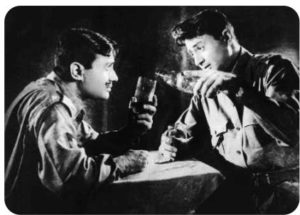 Jaidev and Dev Anand made a perfect musical duo. Jaidev’s fortune turned when Dev Anand signed him for Hum Dono, a musical set in the army backdrop with Dev Anand in a double role. The film had all time classic song gems like the two evocative devotionals – Allah tero naam and Prabhu tero naam (in the heavenly voice of Lata Mangeshkar), the effervescent philosophical rhapsody – Main zindagi ka saath nibhaata chala gaya (Mohammed Rafi in an animated and free-wheeling spirit), the dulcet ‘insatiable love’ duet – Abhi na jao chhodkar (Mohammed Rafi and Asha Bhosle at their romantic best), the empathic sonnet – Jahan mein aisa kaun hai (Asha Bhosle at her pensive best) and the poignant ghazal (Rafi at his plaintive best) – Kabhi khud pe kabhi halaat pe rona aaya (an introspection of the ceaseless struggles, setbacks and short lived success ordained on Jaidev – The Jinxed Genius). All the songs were penned by the prolic poet-lyricist Sahir Ludhianvi who infused poetry and philosophy, pain and passion and spright and spirituality in the evergreen career defining songs of the maestro.
Jaidev and Dev Anand made a perfect musical duo. Jaidev’s fortune turned when Dev Anand signed him for Hum Dono, a musical set in the army backdrop with Dev Anand in a double role. The film had all time classic song gems like the two evocative devotionals – Allah tero naam and Prabhu tero naam (in the heavenly voice of Lata Mangeshkar), the effervescent philosophical rhapsody – Main zindagi ka saath nibhaata chala gaya (Mohammed Rafi in an animated and free-wheeling spirit), the dulcet ‘insatiable love’ duet – Abhi na jao chhodkar (Mohammed Rafi and Asha Bhosle at their romantic best), the empathic sonnet – Jahan mein aisa kaun hai (Asha Bhosle at her pensive best) and the poignant ghazal (Rafi at his plaintive best) – Kabhi khud pe kabhi halaat pe rona aaya (an introspection of the ceaseless struggles, setbacks and short lived success ordained on Jaidev – The Jinxed Genius). All the songs were penned by the prolic poet-lyricist Sahir Ludhianvi who infused poetry and philosophy, pain and passion and spright and spirituality in the evergreen career defining songs of the maestro.
Jaidev Proposes ~ Dev Disposes
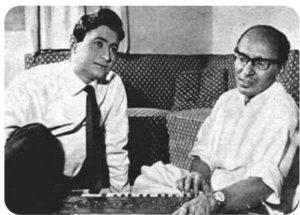 It is believed that post Hum Dono’s success, an unwritten promise was made by Dev Anand that every alternate film of Navketan will have music by the two wizards S D Burman and Jaidev. As per the promise, S D Burman was entrusted the music of the social comedy Tere Ghar Ke Saamne and Jaidev ‘signed’ for the more serious Guide. He is believed to have composed a couple of tunes too, going gung-ho for Guide. Jaidev was heartbroken when the film was finally made and released with music by S D Burman, undoubtedly his career best score. Jaidev proposes, Jai Dev disposes!
It is believed that post Hum Dono’s success, an unwritten promise was made by Dev Anand that every alternate film of Navketan will have music by the two wizards S D Burman and Jaidev. As per the promise, S D Burman was entrusted the music of the social comedy Tere Ghar Ke Saamne and Jaidev ‘signed’ for the more serious Guide. He is believed to have composed a couple of tunes too, going gung-ho for Guide. Jaidev was heartbroken when the film was finally made and released with music by S D Burman, undoubtedly his career best score. Jaidev proposes, Jai Dev disposes!
For the first time, Jaidev felt exploited and stifled at Navketan and Guide marked the end of his long and fruitful musical association with both Dev Anand and S D Burman. Though the hurt feeling lurked in his mind for long, his respect and reverence for S D Burman remained the same till his last. Besieged by a chain of misfortunes, Jaidev made Main zindagi ka saath nibhata chala gaya the mantra of his life with his spiritual ethos to ‘guide’ him.
From Dev to Dutt ~ Dono to Do (Hum Dono to Mujhe Jeene Do)
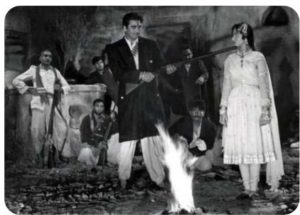 Besides Hum Dono, Sunil Dutt’s Mujhe Jeene Do, a sensitive saga on the life of dacoits, is ranked as yet another musical masterpiece of Jaidev. Collaborating with Sahir again, the twosome enlivened the music lovers with perennial charmers like the enticing mujra imbued in moonlit drizzles of sheer romance – Raat bhi hai kuch bheegi bheegi, the teasing folk based heart-stopper – Nadi naare na jao shyam, the feisty and festive chaiti-thumri-dadra and light classical based – Maang mein bharle rang sakhi ri, the poignant and heart rending lullaby – Tere bachpan ko jawani ki dua deti hoon and the patriotic parable – Ab koyi gulshan na ujde ab watan azaad hai.
Besides Hum Dono, Sunil Dutt’s Mujhe Jeene Do, a sensitive saga on the life of dacoits, is ranked as yet another musical masterpiece of Jaidev. Collaborating with Sahir again, the twosome enlivened the music lovers with perennial charmers like the enticing mujra imbued in moonlit drizzles of sheer romance – Raat bhi hai kuch bheegi bheegi, the teasing folk based heart-stopper – Nadi naare na jao shyam, the feisty and festive chaiti-thumri-dadra and light classical based – Maang mein bharle rang sakhi ri, the poignant and heart rending lullaby – Tere bachpan ko jawani ki dua deti hoon and the patriotic parable – Ab koyi gulshan na ujde ab watan azaad hai.
Parallel Picture Prism
Jaidev was a sensitive and thinking composer and his compositions were of an exalted order – soulful and sublime, spiritual and transcendental, ethereal and heavenly. His music, due to the aesthete value, lacked the so called mass or popular appeal. Ergo, he was considered ideal for music of low budget films, seminal films and art films. The new wave genre created and perpetuated by sensitive filmmakers like Chetan Anand, K A Abbas, Hrishikesh Mukherji, Muzaffar Ali, Basu Chatterji, Bhimsen, B R Ishara, Ved Rahi, Kantilal Rathod, Amol Palekar with lesser known stars invariably had Jaidev in the musical score which he never regretted.
Most of his films ranging from the early Joru Ka Bhai, Anjali, Kinare Kinare to Do Boond Paani, Reshma aur Shera, Prem Parbat, Parinay, Alaap, Gaman, Tumhare Liye, Dooriyan, Ankahee, Chand Grahan (except Hum Dono, Mujhe Jeene Do and Gharonda) failed at the box office. They are remembered today at best only for their rich, classy, soulful music which went on to win him several awards. An ensemble of select musical marvels of Jaidev is appended for lovers of his music.
Art Unfulfilled
There were several films like Aatish (or Daulat Ka Nasha), Amar Jyoti, Annada Didi, Azaadi Pachhis Baras Ki, Ek Tha Chandar Ek Thi Sudha (announced with Amitabh Bachchan and Jaya Bhaduri), Footpath (which has Asha Bhosle’s huskily rendered More naina jaage saari rayna), Khunnas (the film boasts of songs like Sanwariya re kaahe maaro najariya re, one of the best mujras sung by Lata Mangeshkar and Usha Mangeshkar and the Zafar Gorakhpuri penned ghazal, Ishq mein kya kya mere junoon ki, ki na buraayi logon ne laced with sarcasm and cynicism and rendered by Mohammed Rafi), Mulaqat, Shaadi Karlo, Shagun and Rangmanch which never saw the light of the day.
Rangmanch was announced as a musical (on the lines of Alaap) based on the emotional relationship between a middle aged virtuoso and her young disciple. Jaidev recorded as many as ten songs. Had it been made and released and even if it had flopped like many of his other films, it would have at least won him some awards and accolades.
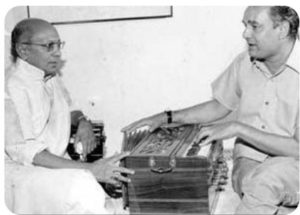 Yet another film titled Chand Grahan was announced way back in the early 70s but the truly ‘eclipsed’ film literally saw the light of the day after 24 years sometime in the late 90s. Jaidev had recorded some classic gems like the divine Main jaanu na ri piya se milan kaise hoye ri (by Lata Mangeshkar) and Tujhko yoon dekha hai, yoon chaaha, yoon pooja hai and Tumhi ne dil ko dil samjha nahin hai (by Mukesh). Sadly, these and many other classic compositions of Jaidev went unnoticed like those from his released films.
Yet another film titled Chand Grahan was announced way back in the early 70s but the truly ‘eclipsed’ film literally saw the light of the day after 24 years sometime in the late 90s. Jaidev had recorded some classic gems like the divine Main jaanu na ri piya se milan kaise hoye ri (by Lata Mangeshkar) and Tujhko yoon dekha hai, yoon chaaha, yoon pooja hai and Tumhi ne dil ko dil samjha nahin hai (by Mukesh). Sadly, these and many other classic compositions of Jaidev went unnoticed like those from his released films.
Jaan without Jaidev
Jaidev remained a high minded man of strong conviction and principles. He was not one to compromise on the quality of work or any other aspect for the sake of commercial acceptance or popular awards and accolades. For instance, following the artistic success of Gaman (which won Jaidev his second National Award for best music), Muzaffar Ali had signed Jaidev to give music for his next film Umrao Jaan, a musical on the life of the 19th century poetess and courtesan with Rekha in the lead role. Jaidev was suffering from haemorrhoids then and, enduring the pain, he had even composed not less than ten songs for the film sitting on a tyre to prevent discharge of blood.
To a request made by the filmmaker about a suitable voice for the visage of the protagonist, Jaidev was quick to suggest the name of Madhurani; she was an accomplished ghazal-dadra-thumri singer with profound pathos in her voice, considered ideal to sing for the character of Umrao Jaan. Having the patronage of ghazal maestro Mehdi Hasan was in itself a rare honour and spoke highly of her caliber. Coming back to the choice of singer, Muzaffar Ali and his wife agreed to the suggestion of Jaidev. But, as an afterthought, they came up with the idea of recording a couple of songs in the voice of a known and popular singer; a principled man that Jaidev was, he left the film without even thinking twice the huge difference it would have made to his career commercially. Eventually, the music of Umrao Jaan was scored by Khayyam and the songs were rendered by ‘that known and popular singer’. The rest is history.
Rights Wronged
As compared to his contemporaries, Jaidev was underpaid and many a times not paid on time or never paid. Money considerations did not dilute his passion or affect the quality of work. He was a workaholic and had a madness to his method; he took note of the backdrop of the film, the situation, the character, the dialect, the lyrics and worked meticulously on the details of the song, its arrangement and orchestration till the final take. No doubt he was exploited by people but of which he was quite aware. Only in extreme cases, he dissociated himself from the composing assignment and cut off his ties with the filmmakers (as he did with Dev Anand and S D Burman after the Guide goof-up and with Muzaffar Ali). Not many know that Jaidev made the title track of Ramanand Sagar’s epoch making serial Ramayan. He left the serial in a huff at the nascent stage itself as he was not even reimbursed the taxi fare (from Churchgate to Natraj Studios, Andheri East), leave aside the credit or remuneration for composing. The pinch and hurt comes through the metaphorical lines of noted poet Muztir Akbarabadi :
जब गुलिस्तां को खूं की ज़रूरत पड़ी,
सबसे पहले हमारी ही गर्दन कटी;
फिर भी कहते हैं हुमसे ये एहल-ए-चमन,
ये चमन हमारा है, तुम्हारा नहीं;
ऐ मेरे हमनशीं चल कहीं और चल,
इस चमन में अब अपना गुज़ारा नहीं।
(Jab gulistan ko khoon ki zaroorat padi,
Sabse pehle hamaari hi gardan kati;
Phir bhi kehte hain humse ye ehl-e-chaman,
Ye hamara chaman hai, tumhara nahin;
Ae mere hamnasheen chal kahin aur chal,
Is chaman mein ab apna guzara nahin)
Jaidev and his Divas
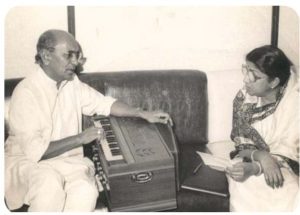 Most of his compositions were very melodious but equally intricate and well nuanced; many of them were women-oriented – ritualistic, ceremonial or seasonal and seeped in our rich tradition and culture. Quite naturally, he banked heavily on front rank mainstream singers like Lata Mangeshkar and Asha Bhosle who held the maestro in very high esteem and did complete justice to his musical demands. Between the two sisters, the latter came across as a spellbinding surprise in Jaidev’s classic collection.
Most of his compositions were very melodious but equally intricate and well nuanced; many of them were women-oriented – ritualistic, ceremonial or seasonal and seeped in our rich tradition and culture. Quite naturally, he banked heavily on front rank mainstream singers like Lata Mangeshkar and Asha Bhosle who held the maestro in very high esteem and did complete justice to his musical demands. Between the two sisters, the latter came across as a spellbinding surprise in Jaidev’s classic collection.
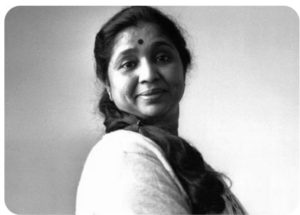 No doubt, Asha Bhosle was at her best singing for O P Nayyar and R D Burman with both of whom she shared a strong emotional bonding too. But when it came to singing for Jaidev, she willingly and expectantly submitted her limber and lithe vocals to his ruthlessly intricate musical demands – ‘murkis’, ‘harkats’, ‘khatkas’ and ‘sapaat taans’. The outcome was unimaginably awesome as could be seen from a wide variety of songs she excelled in such as:
No doubt, Asha Bhosle was at her best singing for O P Nayyar and R D Burman with both of whom she shared a strong emotional bonding too. But when it came to singing for Jaidev, she willingly and expectantly submitted her limber and lithe vocals to his ruthlessly intricate musical demands – ‘murkis’, ‘harkats’, ‘khatkas’ and ‘sapaat taans’. The outcome was unimaginably awesome as could be seen from a wide variety of songs she excelled in such as:
the Pilu ~ Kaafi ~ Patdeep based thumri – Hum sang naina kaahe ko lagaaye (Joru Ka Bhai);
the rare Chandranandan (a raga invented by his mentor Ustad Ali Akbar Khan) and Malkauns ~ Bhairavi based sentimental serenade – Raat ke pichhle pehron mein (Anjali);
the Hansadhwani ~ Khamaj ~ Maaru Bihag ~ Yaman based flirtatious folk – Nadi naare na jao shyam and the Chaiti-Dadra-Thumri styled marriage song – Maang mein bharle rang sakhi ri which has shades of a Pahadi ~ Bahar ~ Pilu ~ Jaijawanti ~ Khamaj (both the songs from Mujhe Jeene Do);
the Pahadi ~ Khamaj ~ Maand based pathos laden plea – Jaa ri pawaniya piya ke des jaa (Do Boond Paani);
the Shivaranjani based rhythmic and rumbustious multi hued (mujra-qawali-folk-classical) sensuous and ‘breathtaking’ caper – Ek to ye bharpur jawani (Reshma aur Shera);
the Bageshri ~ Gaara ~ Kaafi based Meera bhajan – Piya ko milan kaise hoye ri (Andolan); the other version of this set to Charukesi ~ Khamaj ~ Gaud Sarang ~ Sohani in a different tune was rendered by Lata Mangeshkar in the ‘eclipsed’ film Chand Grahan;
the Khamaj ~ Maanjh Khamaj based nostalgic Mere dil mein teri tasveer (Ek Huns Ka Joda);
the Khamaj ~ Maanjh Khamaj based raas styled romantic – Bansuriya mann har le gayi (Tumhare Liye);
the Bhairavi ~ Bilaskhani Todi based heart rending ghazal Zehar deta hai koyi, koyi dawa deta hai (Sameera);
the Malkauns based huskily rendered romantic – More naina jaage saari raina (from the unreleased Footpath);
the Bhairavi based Kabir’s mystic philosophy – Kauno thagva lootal ho (Ankahee) – about the impermanence of body, the ephemeral and transient life, the end of relationship with the world and the final journey of the soul to its permanent abode.
Unfortunately, many of these songs did not achieve the popularity they deserved; they remain unsung like the maestro himself and lay buried in the dust filled shelves of a few collectors.
The ragas mentioned above are indicative and are subject to debate and reasoning.
Talent Tapper
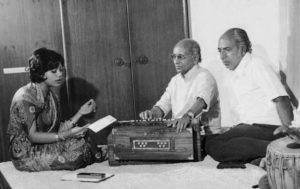 Jaidev discovered new talents with a missionary zeal, trained and groomed them and introduced them as singers and / or gave a major fillip to their budding careers with a great feeling of fulfillment. The long list of wannabe singers with unconventional voices include names of now great reckoning like Chhaya Ganguli, Faiyyaz, Hiradevi Mishra, Laxmi Shankar, Madhurani, Neelam Sahni, Parveen Sultana, Peenaz Masani, Runa Laila (with Jaidev and Naqsh Lyalpuri in the inset photograph), Sarla Kapoor, Shobha Kapoor, Vani Jairam and, among the males, names like Bhupendra, Hariharan, Rajendra Mehta, Sharma Brothers, Suresh Wadkar and Yesudas many of whom owe a great share of their initial success to Jaidev.
Jaidev discovered new talents with a missionary zeal, trained and groomed them and introduced them as singers and / or gave a major fillip to their budding careers with a great feeling of fulfillment. The long list of wannabe singers with unconventional voices include names of now great reckoning like Chhaya Ganguli, Faiyyaz, Hiradevi Mishra, Laxmi Shankar, Madhurani, Neelam Sahni, Parveen Sultana, Peenaz Masani, Runa Laila (with Jaidev and Naqsh Lyalpuri in the inset photograph), Sarla Kapoor, Shobha Kapoor, Vani Jairam and, among the males, names like Bhupendra, Hariharan, Rajendra Mehta, Sharma Brothers, Suresh Wadkar and Yesudas many of whom owe a great share of their initial success to Jaidev.
Lasting Lyricism
Besides setting to tune the lyrics of prolific mainstream writers like Balkavi Bairagi, Gulzar, Indivar, Jan Nisar Akhtar, Kaifi Azmi, Naqsh Lyallpuri (Jaidev tuned his lyrics the most), Nyay Sharma, Rajinder Krishan, Sahir Ludhianvi, Sudarshan Fakir and Vishwamitra Adil, Jaidev was a master in the art and craft of composing the literary works of renowned Chhayawadi writers like Jaishankar Prasad, Mahadevi Verma (who had given a blanket permission to Jaidev to use all her writings), Maithili Sharan Gupta, Suryakant Tripathi ‘Nirala’.
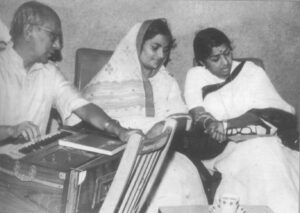 Jaidev also gave musical expression to the literary works of other eminent poets and writers like Dharamveer Bharti, Harivanshrai ‘Bachchan’ (‘Madhushala’ containing 135 quatrains (verses of 4 lines each) in the voice of Manna Dey), Narendra Sharma (Jo samar mein ho gaye amar), Padma Sachdev (with Jaidev and Lata Mangeshkar in the inset photograph), Raamdhaari Sinh ‘Dinkar’ (Urvashi), Ram Prasad ‘Bismil’ (Sarfaroshi ki tamanna) and Urdu poets like Firaq Gorakhpuri, Jigar Moradabadi, Makhdoom Mohiuddin, Rahi Masoom Reza, Shahryar.
Jaidev also gave musical expression to the literary works of other eminent poets and writers like Dharamveer Bharti, Harivanshrai ‘Bachchan’ (‘Madhushala’ containing 135 quatrains (verses of 4 lines each) in the voice of Manna Dey), Narendra Sharma (Jo samar mein ho gaye amar), Padma Sachdev (with Jaidev and Lata Mangeshkar in the inset photograph), Raamdhaari Sinh ‘Dinkar’ (Urvashi), Ram Prasad ‘Bismil’ (Sarfaroshi ki tamanna) and Urdu poets like Firaq Gorakhpuri, Jigar Moradabadi, Makhdoom Mohiuddin, Rahi Masoom Reza, Shahryar.
Very few composers had the privilege of such an illustrious musical association with literary writers. He also musically embellished the writings of great poet Mirza Ghalib and saints like Kabirdas, Tulsidas, Surdas, Meerabai in films like Andolan, Ankahee, Chand Grahan and private albums. As such, his compositions for films were as marked and distinct as his non-film works.
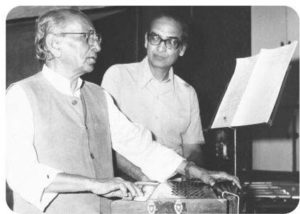 The wide variety of singers, writers, musicians and filmmakers with whom Jaidev collaborated gives a deep insight of the genre of his music. It ranged from the melody imbued songs with strong classical and folk base to songs with devotional-patriotic-philosophical fervour to romantic ghazals and nazms to euphonious interpretation of literary works.
The wide variety of singers, writers, musicians and filmmakers with whom Jaidev collaborated gives a deep insight of the genre of his music. It ranged from the melody imbued songs with strong classical and folk base to songs with devotional-patriotic-philosophical fervour to romantic ghazals and nazms to euphonious interpretation of literary works.
As mentioned before, Jaidev’s compositions were of an exalted order – soulful and sublime, spiritual and transcendental and set to classical ragas. He embellished the songs with liberal use of Indian instruments particularly the flute, sitar and sarod which enhanced the euphonic appeal of the compositions. The listener found an elevation onto celestial heights.
Awards and Accolades
Jaidev stands tall as the only composer of the Golden Era of Music to have been honoured thrice with the prestigious National Film Award for Best Music for his outstanding scores in Reshma aur Shera, Gaman and Ankahee. He was a four time recipient of the Sur Singar Samsad Awards for his rich classical scores in Reshma aur Shera, Alaap, Tumhare Liye and Ankahee.
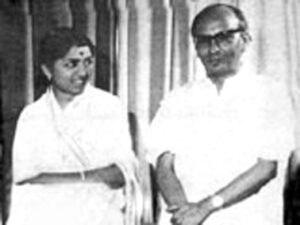 Award and accolades never stopped coming his way. Jaidev was honoured in December 1986, just a few days before his passing away, with the prestigious Lata Mangeshkar Award instituted by the Madhya Pradesh Government. The citation afforded him a cash prize of Rupees One Lakh for excellence, creativity, long dedication and continuing performance in the field of light music.
Award and accolades never stopped coming his way. Jaidev was honoured in December 1986, just a few days before his passing away, with the prestigious Lata Mangeshkar Award instituted by the Madhya Pradesh Government. The citation afforded him a cash prize of Rupees One Lakh for excellence, creativity, long dedication and continuing performance in the field of light music.

Lonesome and Luckless
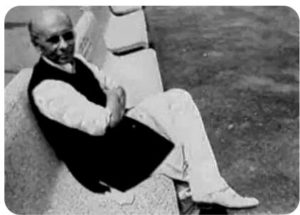 Jaidev lived a nomadic life in the earlier phase of his life and remained homeless till the very end. Mostly left alone, Jaidev had a few friends mostly from the literary fields or judges, lawyers, painters, high rank officials and dignitaries. He needed a room to display his awards and trophies but sadly, most part of his life in Bombay, he lived alone as a tenant in a single room at Lily Court, near Ritz Hotel, Churchgate. His ‘Gharonda’ song Ek akela is shehar mein aab-o-dana dhoondhta hai, ashiyana dhoondhta hai… was almost biographical and depicted his plight.
Jaidev lived a nomadic life in the earlier phase of his life and remained homeless till the very end. Mostly left alone, Jaidev had a few friends mostly from the literary fields or judges, lawyers, painters, high rank officials and dignitaries. He needed a room to display his awards and trophies but sadly, most part of his life in Bombay, he lived alone as a tenant in a single room at Lily Court, near Ritz Hotel, Churchgate. His ‘Gharonda’ song Ek akela is shehar mein aab-o-dana dhoondhta hai, ashiyana dhoondhta hai… was almost biographical and depicted his plight.
I had the opportunity of meeting the genius just once in the early 80s. I had gone to invite him as a Judge for a music competition in IDBI where I worked for about 16 years. He asked me to meet him again but I couldn’t; the typical look of a lonesomeness with a cot, a cupboard (gifted to him by C Ramchandra), a fridge and books, magazines and newspapers strewn all over and, of course, a Harmonium and pair of Tabla, did not quite create an impression of him as a ‘serious and good composer’. Only much later, his ‘greatness’ dawned on me and my sensibilities woke up to the fact that I, like many others, had commited an unpardonable blunder of underestimating him like many others. I realised later that it was in that single room, the genius composer had created and composed all his mellifluous tunes and veered the destiny of a number of aspiring and upcoming singers who waited t his open doorstep for hours together with unabated hope and patience.
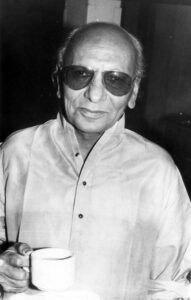 He seemed happy in that single room; he had no option but to pretend so because each time his case was taken up for allotment of a house by the Government, bad luck struck and the allotment got delayed inordinately under some pretext or the other. It was sometime in the end of 1986 he was allotted a flat in Bandra by Rafiq Zakaria, the then Minister for Urban Development, Government of Maharashtra … but the letter did not reach him as he was thrown out of his accommodation by the cantankerous Parsi land lady to whom the ownership of the place had transferred after the original landlord had passed away. This episode is the only ‘discordant note’ in his otherwise melodious repertoire!
He seemed happy in that single room; he had no option but to pretend so because each time his case was taken up for allotment of a house by the Government, bad luck struck and the allotment got delayed inordinately under some pretext or the other. It was sometime in the end of 1986 he was allotted a flat in Bandra by Rafiq Zakaria, the then Minister for Urban Development, Government of Maharashtra … but the letter did not reach him as he was thrown out of his accommodation by the cantankerous Parsi land lady to whom the ownership of the place had transferred after the original landlord had passed away. This episode is the only ‘discordant note’ in his otherwise melodious repertoire!
Jaidev was virtually on streets when he was receiving the Lata Mangeshkar Award and the cash prize of Rupees One Lakh. He mockingly called himself a ‘Lakhpati’ when he received the cheque but unfortunately, he never found time to deposit it in the bank due to his constant shuttling between Bombay-Indore-Delhi in connection with the award ceremonies and felicitations and work assignments. Meanwhile, he was recording an album of ghazals penned by Firaq Gorakhpuri then, a long cherished dream that came true.
After he was evicted from the single room, he stayed with a friend for a few days; he didn’t want to be a burden on anybody and soon shifted to the South Green Hotel. He was a tired man by then; age too was catching up and his health also started deteriorating. A couple of months before he died, he had lost appetite for food and each time he went to the hotel (Ritz and Gazebo where he regularly had his food), the aroma of the food deterred him from even entering the hotel.
Elegy to the Ethereal
He vomited blood on 3 January, 1987 and was admitted in the Breach Candy Hospital. In the morning hours of 6 January, 1987, he breathed his last and left the world, unsung and unwept. Contrary to the proverbial phrase ‘cruel death’, it was Life which had been cruel to him and Jaidev found deliverance in death. As Sahir put it :
मौत कितनी भी संगीन हो मगर, ज़िंदगी से तो मेहरबां होगी,
हम न होंगे तो ग़म किसे होगा, ख़त्म हर ग़म की दास्तां॰
(Maut kitni bhi sangeen ho magar, zindagi se toh mehrbaan hogi,
Hum na honge toh gham kise hoga, khatm har gham ki dastaan hogi).
He had no family of his own to moan his death; only a handful from the film fraternity and a few close associates were present at his funeral to grieve at the loss of a colossal talent which the film industry had so ruthlessly disregarded and neglected.
This truism must have dawned on him at the twilight of his life:
वक़्त की धूप में यादें भी पिघल जाती हैं,
मुझको भी लोग भुला देंगे फ़साने की तरह।
(Waqt ki dhoop mein yaaden bhi pighal jaati hain,
Mujhko bhi log bhula denge fasaane ki tarah).
Time made the industry forget the unsung genius but his wide repertoire of great musical works gave music lovers an experience of timelessness.
With all the appreciation, awards and accolades, he did not get commercial acceptance and the deserved recognition as a front rank composer which is a sad reflection of the culture of modern cinema and the society at large. While many of his contemporaries met with success, both in terms of name, fame and fortune and remained in limelight for most part of their life, Jaidev lived and died in wilderness and amidst adversities. His creatively eventful and enviable but commercially unfortunate career is epitomised by the couplets of Qateel Shifai :
गर्मी-ए-हसरत-ए-नाकाम से जल जाते हैं,
हम चरागों की तरह शाम से जल जाते हैं;
शमा जिस आग में जलती है नुमाइश के लिए,
हम उसी आग में गुमनाम से जल जाते हैं।
(Garmi-e-hasrat-e- nakaam se jal jaate hain,
Hum charaghon ki tarah, shaam se jal jaate hain;
Shama jis aag mein jalti hai numayish ke liye,
Hum usee aag mein gumnaam se jal jaate hain)
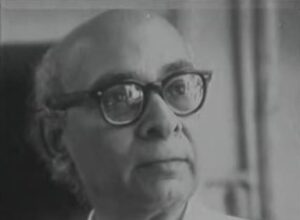 He got fame and fortune at the twilight of his career but he was neither fortunate to live with it nor fortunate to leave the world without suffering. True to the couplet of Harivanshrai Bachchan, Jaidev left the world when he had just ‘arrived’, his going was as imminent as his ‘coming’, his adieu was forgone in the ‘welcome’ and the closure pre-empted the opening in the bachhanal tavern of his life.
He got fame and fortune at the twilight of his career but he was neither fortunate to live with it nor fortunate to leave the world without suffering. True to the couplet of Harivanshrai Bachchan, Jaidev left the world when he had just ‘arrived’, his going was as imminent as his ‘coming’, his adieu was forgone in the ‘welcome’ and the closure pre-empted the opening in the bachhanal tavern of his life.
With Warm jaiDEVOUT Regards
Manohar Iyer
Classic Gems of Jaidev
| Film | Song | Singer/s |
| Joru Ka Bhai | Ab tera intzaar kaun kare | Talat Mahmood |
| Anjali | Kis kisko deepak pyar kare | Lata Mangeshkar |
| Hum Dono | Allah tero naam | Lata Mangeshkar |
| Hum Dono | Kabhi khud pe kabhi halaat pe rona aaya | Mohammed Rafi |
| Hum Dono | Main zindagi ka saath nibhata chala gaya | Mohammed Rafi |
| Hum Dono | Abhi na jao chhodkar | Mohammed Rafi-Asha Bhosle |
| Mujhe Jeene Do | Raat bhi hai kuch bheegi bheegi | Lata Mangeshkar |
| Mujhe Jeene Do | Tere bachpan ko jawani ki dua deti hoon | Lata Mangeshkar |
| Mujhe Jeene Do | Maang mein bharle rang sakhi ri | Asha Bhosle |
| Kinare Kinare | Dekhli teri khudaayi | Talat Mahmood |
| Kinare Kinare | Har aas ashkbaar hai | Lata Mangeshkar |
| Kinare Kinare | Aaj achanak toot gayi | Lata Mangeshkar |
| Kinare Kinare | Jab gham-e-ishk satata hai | Mukesh |
| Reshma aur Shera | Tu chanda main chandni | Lata Mangeshkar |
| Reshma aur Shera | Ek meethi si chubhan | Lata Mangeshkar |
| Do Boond Paani | Jaa ri pawaniya piya ke des jaa | Asha Bhosle |
| Do Boond Paani | Peetal k mori gaagri | Parveen Sultana-Minoo Purshottam |
| Maan Jaaiye | O mitwa badra chhaaye re | Lata Mangeshkar |
| Maan Jaaiye | Ye wohi geet hai | Kishore Kumar |
| Prem Parbat | Ye dil aur unki nigahon ke saaye | Lata Mangeshkar |
| Prem Parbat | Ye neer kahan se barse | Lata Mangeshkar |
| Prem Parbat | Mera chhota sa gharbaar | Lata Mangeshkar |
| Chand Grahan | Main jaanu naahin | Lata Mangeshkar |
| Parinay | Jaise suraj ki garmi se | Sharma Brothers |
| Parinay | Mitwa mitwa more man mitwa | Manna Dey-Vani Jairam |
| Andolan | Piya se milan kaise hoye ri | Asha Bhosle |
| Andolan | Dar-o-deewar pe hasrat se | Bhupendra |
| Ek Huns Ka Joda | Saathi milte hain badi mushqil se | Kishore Kumar |
| Ek Huns Ka Joda | Mere dil mein teri tasveer | Asha Bhosle |
| Gharonda | Ek akela is shehar mein | Bhupendra |
| Alaap | Koyi gaata main so jaata | Yesudas |
| Alaap | Chand akela jaaye sakhi ri | Yesudas |
| Alaap | Kaahe manva naache | Lata Mangeshkar |
| Alaap | Aayi ritu sawan ki | Bhupendra-Faiyyaz |
| Alaap | Maata saraswati sharda | Lata Mangeshkar-Madhurani-Dilraj Kaur-Yesudas |
| Dooriyan | Zindagi zindagi mere ghar aana | Bhupendra-Anuradha Paudwal |
| Dooriyan | Zindagi mein jab tumhare gham nahin the | Bhupendra-Anuradha Paudwal |
| Gaman | Aap ki yaad aati rahi | Chhaya Ganguli |
| Gaman | Seene mein jalan | Suresh Wadkar |
| Gaman | Aaja sanwariya | Hira Devi Mishra |
| Gaman | Ajeeb saaniha mujhpar guzar gaya | Hariharan |
| Tumhare Liye | Tumhen dekhti hoon | Lata Mangeshkar |
| Tumhare Liye | Bole radha shyam diwani | Lata Mangeshkar |
| Tumhare Liye | Bansuriya mann har le gayi | Asha Bhosle |
| Sameera | Zehar deta hai koyi | Asha Bhosle |
| Trikon ka Chautha Kon | Main to kab se teri sharan mein hoon | Hariharan-Neelam Sahni |
| Ankahee | Raghuvar tumko meri laaj | Bhimsen Joshi |
| Ankahee | Kauno thagva nagariya lootal ho | Asha Bhosle |
| Khunnas | Ishq mein kya kya mere junoon ki | Mohammed Rafi |
| Footpath | More naina jaage saari raina | Asha Bhosle |


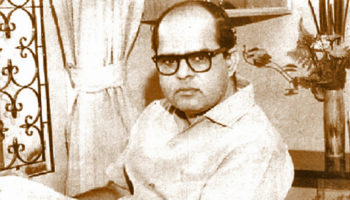
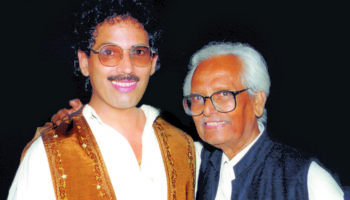
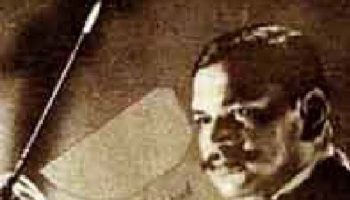
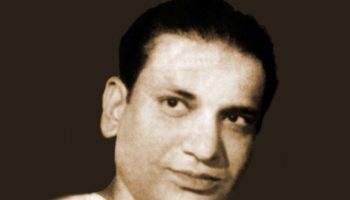
Hi
Did Jaidevji assist Burman dada in Teen Deviyan too ? I find that the notations of ” aise toh na Dekho ” from this film quite similar to “kabhi Khudpe ” from Hum Dono ”
Regards
Very much Salian Sahab. Same raga too. As assistant, he composed the ghazal Kahin bekhayal hokar (as well as Hum bekhudi mein). Majrooh sahab himself let me know into this. As assistants, Ghulam Mohammed, Ravi, LP, RDB have all have composed for their masters. All of them were master composers.